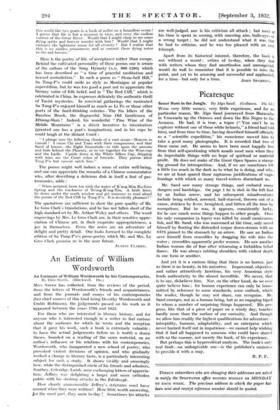An Estimate of William Wordsworth
Miss SMITH has. collected, from the reviews of the period, from the letters of Wordsworth's friends and acquaintances, and from the journals and essays of his contemporaries (her chief sources of this kind being Dofothy Wordsworth and Crabb Robinson), the judgements passed on his work as it appeared between the years 1793 and 1822.
For those who are interested in literary history, and for anyone who is interested enough in a writer to feel curious about the audience for which he wrote and the reception that it gave his work, such a book is extremely valuable : to have the actual judgements before us is worth a dozen theses, founded on a reading of the same material, on an author's influence or his relations with his contemporaries. Wordsworth, who inaugurated a new school of poetry, who provoked violent divisions of opinion, and who gradually worked a change in literary taste, is a particularly interesting. subject for such a study. It shows vividly and amusingly how, while the distinguished circle of his friends and admirers, Southey, Coleridge, Lamb, were exchanging letters of apprecia- tion, Jeffrey was delighting a larger and more orthodox public with his slashing attacks in the Edinburgh.
How clearly unanswerable Jeffrey's strictures must have seemed when they were written! How little worth answering, for the most part, they seem to-day ! Sometimes his attacks
are well-judged, nor is his criticism all attack ; but most of his time is spent in scoring, with unerring aim, bulls-eyes on a wrong target ; he did not understand what it was that he had to criticize, and he was too pleased with an easy triumph.
Apart from its historical interest, therefore, the book is not without a moral : critics of to-day, when they deal with writers whom they find unorthodox and uncongenial, would do well to remember that it is possible to miss the point, and yet to be amusing and successful and applauded,






























 Previous page
Previous page